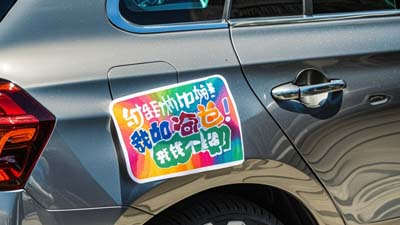In recent years, the number of private cars and younger owners in China has steadily risen, bringing with it, the pursuit of “个性 (gèxìng),” or individuality through a more colorful and personal “爱车 (àichē) car.” The simple, but sweet application of a unique “车贴 (chētiē) sticker” seems to be just what the trend orders.
Bumper car stickers are currently all the rage, with innovative designs and clever phrases to represent even the most lavish of owners. Let’s take a look at a few selections that are a bit over the top:
1. 帅哥 (shuàigē) IN CAR Handsome guy in car

A mixture of Chinese and English forms this one. “帅哥 (shuàigē)” means handsome guy. It’s a not-so-modest way of saying “Yes, I’m pretty, but please mind the road. Sincerely, Handsome Guy.”
2. 保持距离,别逼我变形!(Bǎochí jùlí, bié bī wǒ biànxíng!) Keep your distance, don’t make me transform!

This one uses a symbol from the Transformers. “保持 (bǎochí)” means to keep. “距离 (jùlí)” means distance. “别 (bié)” means do not. “逼 (bī)” means to force. “变形 (biànxíng)” means to transform. It’s an easy way to remind drivers to keep a distance that would make Optimus Prime proud.
3. 别加满!我钱不够。(Bié jiā mǎn! Wǒ qián bú gòu.) Don’t top off my gas, I don’t have enough money.

This one is a reflection on the ever-increasing price of oil in China. “别加满 (bié jiā mǎn)” means don’t top off my gas. “我钱不够 (wǒ qián bú gòu)” means I don’t have enough money.
So what do you think of these stickers? Cool? Corny? Exciting? They definitely make idle time in traffic more fun! Do you have a favorite sticker you’ve seen before? Please share it with us. If not, try creating your own now!
Language Points:
爱车 (àichē) n. car
Besides the name “私家车 (sījiāchē) private cars,” many people like to address their cars as “爱车 (àichē).” “爱 (ài)” means to love. The name shows people’s deep affection for their four-wheeled friends.
Example:
Wǒ duì wǒ de àichē jiù xiàng duìdài wǒ de lǎopo yíyàng!
我 对 我 的 爱车 就 像 对待 我 的 老婆 一样!
I love my car as much as I love my wife!
个性 (gèxìng) n./adj. individuality/individual
Examples:
Tā jiù shì nà zhǒng gèxìng, bú shì hěn xǐhuan shuōhuà.
她 就 是 那 种 个性,不 是 很 喜欢 说话。
Her distinguishing trait is simply this: she doesn’t like to talk.
Tā shì ge hěn yǒu gèxìng de rén.
他 是 个 很 有 个性 的 人。
He’s a man with individuality.
Practice:
Wǒ yào gěi wǒ de ___ chē shèjì yíge xīn de chētiē.
1. 我 要 给 我 的___ 车 设计 一个新 的 车贴。
I’ll design a new sticker for my car.
Choose the correct answer to fill in the blank.
A. 爱 (ài) B. 喜欢 (xǐhuan) C. 讨厌 (tǎoyàn)
Jiějie shì ge hěn yǒu gèxìng de rén.
2. 姐姐 是 个 很 有 个性 的 人。
Which of the following answers is correct according to the sentence above?
A. My sister likes people with individuality.
B. My sister doesn’t like people with any individuality.
C. My sister is a person with individuality.
Answers to the practice: 1. A. 2. C



